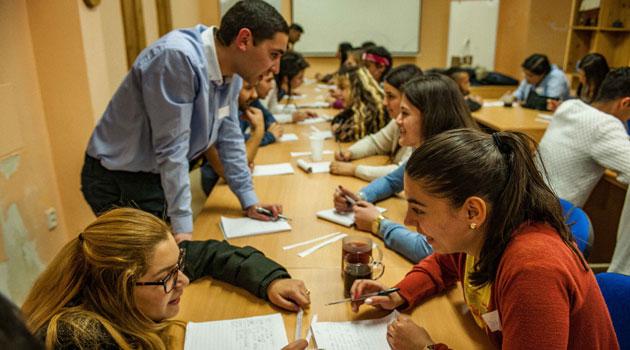Czech Vice-Mayor says Czech Govt's method for collecting data about Romani people is "inhumane"

The Czech town of Liberec is refusing to send a report about the state of the Romani minority to the Regional Authority for delivery to the Office of the Czech Government. Such a report has, for years, served as background material for a nationwide report on that issue.
Czech Vice-Mayor for Social Affairs Ivan Langr (Greens) says he considers the methodology recommended by the Office of the Government for compiling the report to be inhumane. He does not like how Romani people are supposed to be identified according to those recommendations.
“We want to ascertain whether it is actually acceptable to base monitoring documents of this type on anthropology and generalized social models. We also want to find out whether all of this is in accordance with the Czech Republic’s official human rights policy,” Langr said in a commentary on the methodology that he sent to the Czech media.
Methodological Instruction of the Office of the Czech Government
“We consider individuals to be Romani who consider themselves to be Romani, including those who do not necessarily espouse that association under all circumstances (e.g., during the census), and/or individuals who are considered Romani by a significant proportion of those around them on the basis of actual or perceived indicators (anthropological, cultural or social). This is an expert estimate made by the observer based on specific knowledge of the environment observed and its context. Its purpose is to acquire non-specific (anonymous) information about the numbers of such people. Under no circumstances is it allowed for the identification of concrete individuals as Romani to occur during this process.“
Langr is bothered by the recommendations made by the Office of the Government in its methodological guidance. He apparently believes that those recommendations advise local bureaucrats, principals, social workers and teachers to specifically identify ethnic Roma “on the basis of actual or perceived indicators (anthropological, cultural or social).”
The vice-mayor is of the opinion that Government buraucrats are encouraging other officials to establish their own sets of recognizable, visible bodily or physical traits through which to determine who is Romani. The resulting numbers based on those sets of traits are then to be used as official statistics, according to Langr.
According to Michal Kačírek, spokesperson for Czech Human Rights Minister Jan Chvojka (Czech Social Democratic Party – ČSSD), none of the Regional Authorities contacted by the Office of the Government has refused its request for the data. The vice-mayor of Liberec is, according to the information available to Kačírek, the only official who has expressed a negative opinion of the methodological guidance through the media.
Kačírek told news server Romea.cz that the Office of the Goverment of the Czech Republic (ÚVČR) did not contact Liberec City Hall, but the Liberec Regional Authority to elaborate such a report about the region, as it has done annually. The Zlín Regional Authority, for example, had no problem providing such qualified estimates.
“According to the qualified estimates, there are 2 464 persons living on the territory of the Zlín Region who claim Romani nationality,” the Zlín Regional Authority has stated in a press release. “The estimate is based on data provided by individual towns, but it can be assumed that many more Romani people live in the region than stated in the estimate. The biggest number of citizens of Romani nationality is reported by Vsetín (600), then by Kroměříž (530) and then by Valašské Meziříčí (300),” Regional Councilor Michaela Blahová, responsible for family policy, the nonprofit sector and social affairs, explained to news server Romea.cz – without any problem.
Langr: “False statistics” created from generalized behavioral models or social customs and notionally visible features
“The gist of elaborating the reports sent to the ÚVČR by the Regional Authorities is contained in the methodological guidance that explains why the ÚVČR needs this data. This has to do in particular with assessing the impact of policies in the area of Romani integration in relation to the Romani Integration Strategy to 2020,” Kačírek told news server Romea.cz.
“We are aware of the complexity and the sensitivity of collecting data that has what is termed an ethnic basis (ethnic data). For the purposes of assessing the priorities of the Romani Integration Strategy to 2020, this data collection, at least at the level of qualified estimates, is essential. Only under such conditions can the Governmment of the Czech Republic establish new measures and adapt existing ones aimed at supporting the integration of Romani people into society. The data acquired aid, in a basic way, with the ongoing monitoring and assessment of the impacts of the activities, policies and specific programs implemented,” Kačírek quoted from the guidance sent to the Regional Authorities.
“There is probably nothing wrong with monitoring the quality of life of ethnic and national minorities and their coexistence with the majority society, and noting wrong with using qualified estimated numbers from organizations who work with such persons as target groups. However, we cannot create false statistics of members of a minority according to generalized behavioral models or social customs and notionally visible features, and we cannot force, on such a basis, those who (may) correspond to such a scheme into a pigeonhole that they themselves reject,” said Langr.
In the 21st cenutry, categorizing minority affiliation based on appearance is, in Langr’s view, dangerous and inhumane, to say nothing of repulsive after the experience of the Holocaust. Kačírek rejects that characterization of the process.
“The Office of the Government of the Czech Republic is not creating ‘false statistics’ under any circumstances, but is basing its assessments on what are termed qualified estimates. Those qualified estimates facilitate the targeting of the financing of integration measures, especially those using the resources from the European Structural and Investment Funds (ESIF), as well as those from national resources,” Kačírek told Romea.cz.
“Currently that targeting is using the Concept of Social Exclusion in particular. One of the requirements of the European Commission is also that we follow the impact of the interventions from the ESIF on the situation of Romani people living in socially excluded localities or who are at risk of social exclusion. Those findings are based on qualified estimates,” Kačírek said.
Banga: I agree with collecting ethnic data, but the majority cannot determine who is Romani
The Committee of Romani Activists in the Liberec Region (Výbor romských aktivistů libereckého kraje) has expressed support for Langr. “Castes for people in the 21st century should not exist vis-à-vis any minority living on the territory of the Czech Republic, and certainly not through Government bodies,” representatives of the committee said in a statement, adding that they, too, object to the process together with the vice-mayor.
“The ministry should rather collaborate more with governmental and non-governmental bodies in combating poverty and social exclusions. We monitor socially excluded persons, not national minorities,” says the statement provided to news server Romea.cz by the chair of the committee, Jan Cverčko.
Patrik Banga, a journalist and member of the Romani community, agrees with the collection of ethnic data in all areas. “I believe that would aid Romani people with, for example, beginning to gain ground when it comes to holding public office with the awareness that this is the biggest ethnic minority in the Czech Republic,” he told news server Romea.cz, adding that he rejects the idea of majority-society members determining who is of Romani ethnicity.
“The methodology is difficult. It cannot work in such a way that majority-society members will determine who the members of a minority are. In my opinion, it is instead necessary to work with Romani people in such a way that they will want to freely espouse their own origin. That would be the way to acquire actual, real data,” Banga told Romea.cz.
